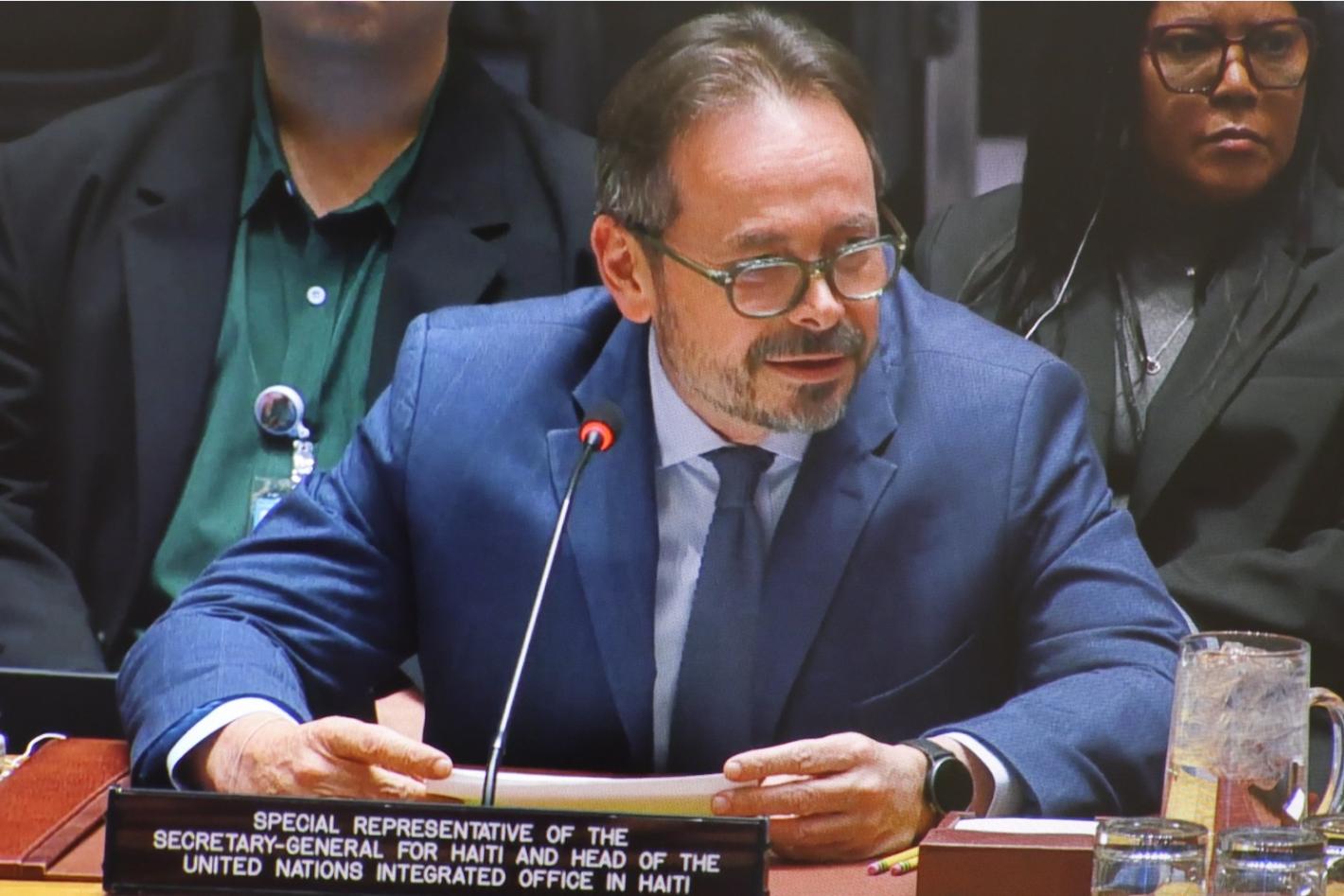Mister/Madam President, Distinguished members of the Council,
1. Thank you for this opportunity to update you on the latest political, security and human rights developments in Haiti, taking place amidst the alarmingly high levels of gang violence in the country.
2. The siege of Haiti’s main fuel terminal that had coincided with months of protests, orchestrated disruptions, and armed roadblocks across the country came to an end in early November through a concerted effort by the Haitian National Police. Fuel began to flow in a number of neighbourhoods in the Port-au-Prince area, allowing hospitals to and businesses to open, creating the semblance of a possible return to normalcy.
3. This hope was quickly dispelled; however, as a new level of gang activity was immediately felt across the capital, marked by spikes in kidnappings, killings and rapes. November witnessed 280 intentional homicides; the highest on record. Equally distressing is the number of abductions for ransom. Reported kidnappings in 2022 have so far exceeded 1,200 cases – double the number recorded in 2021 – making every commute for the average Haitian an ordeal. The increase in recorded rapes reflects a horrendous modus operandi of the gangs, who, as we reported in October, use sexual violence to intimidate and subjugate whole communities. The brutality with which this violence is committed has become a badge of notoriety for perpetrators.
4. Further compounding the plight of the millions living amidst this violence is the catastrophic economic situation, with all main roads in and out of the capital under gang control, stymieing trade. Close to half the population are food insecure, with some 20,000 people facing famine-like conditions. In addition to the large levels of displacements, 34% of schools remain closed. And while State authorities do their best, with UN support, to manage Cholera, suspected cases have reached 15,000, throughout the country’s 10 Departments.
Political developments and public responses
Distinguished members of the Council,
5. The announcement of Resolution 2653 on 21 October was widely welcomed by Haitians. Subsequent bilateral sanctions which followed the publication of the UN resolution appeared to generate a renewed sense of urgency on ways to restore democratically elected institutions. Some in civil society called for sanctioned individuals to step back and make space for necessary reforms to restore functioning, transparent institutions.
6. As the debate grew, BINUH continued with its efforts to advance political dialogue. In October and November, civil society groups launched a new round of inclusive consultations on a transitional road map, with members of the Montana agreement, private sector associations, trade unions and religious organizations. Out of this process a ‘National Consensus’ document was developed. It includes steps for moving the country to elections within an 18-month timeframe, with a transitional council and oversight mechanism. On 6 December, the civil society groups leading these consultations issued their first public communiqué as the ‘Independent Facilitation Committee’, calling for a final agreement by the end of 2022.
7. Other stakeholders have also been active. The 8 December appeal by private sector actors for changes in business practices represented another step in the right direction. It is important that the business community uphold these commitments and strengthen links with civil society and political actors for a solution to the crisis.
8. As I brief the Council, intensive consultations, coupled with efforts to broaden support for the ‘National Consensus’ document, are underway. I encourage all sectors of society, for the sake of the nation, to put aside their differences, and forge a common path for taking the country forward.
Police capacities
Mister/Madam President,
9. While the Government continues to invest in the Haitian National Police, with six new armored vehicles received in October and a dozen more expected in the New Year, the force continues to be under-resourced and insufficiently equipped to address the enormity of the task ahead.
10. Further compounding the challenges posed by the gangs is the fact that the HNP continues to shrink. Rising attrition levels have brought its operational strength to under 13,000 personnel; with fewer than 9,000 available as active-duty officers. Yes, some effective operations against the gangs in Port-au-Prince have been mounted, but holding these security gains continues to be a challenge. The HNP needs assistance in the form of a specialized force, as outlined in the Secretary-General’s letter of 8 October.
11. Civil society groups, political organizations, chambers of commerce, and religious groups are increasingly calling for international operational support to the police – with clear parameters on terms of engagement, and an integrated approach, that would work alongside the HNP, and not substitute for it.
12. I am grateful to those donors who have committed themselves to the Joint Programme of Support to the HNP, with $17.8m so far pledged to the multi-donor basket fund. Programmes to counter illicit weapons and financial flows are now also moving, with clear national ownership .UNODC has provided legal support in drafting the new Customs Code, and is currently mapping transnational criminal networks to understand the reality and extent of firearms and drug trafficking in Haiti.
Distinguished members of the Council,
13. A significant number of Haitian interlocutors have welcomed your recent work. They support the adoption of sanctions as a crucial tool in combatting corruption and impunity.
14. Nonetheless, sanctions will be most effective as part of a comprehensive approach: that includes both the on-going political dialogue; and enhanced operational security support to the HNP, as outlined in the Secretary-General’s letter. These three approaches in parallel will be essential to restoring order, public confidence, and the hope that the country’s tomorrow can be better. Haitians deserve no less.
Thank you.



